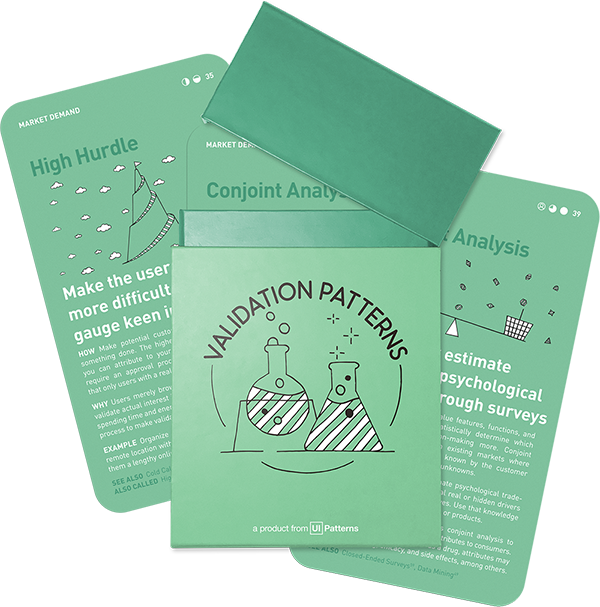See also: Data Mining, Run Test Ads
Difficulty: Intermediate
Evidence strength
Relevant metrics: Segment size, Level of competition, Popularity
Validates: Desirability
How: Enter one or more keywords into free tools like Google Trends or AdWords Keyword planner to receive a visual representation of online interest in those particular keywords dating years back. See what keywords have a downward trend, understand seasonality, or spot up and coming trends.
Why: By using freely accessible tools, you can validate existing interest over time in a topic by spotting relative trends and seasons in popularity over time.
This experiment is part of the Validation Patterns printed card deck
A collection of 60 product experiments that will validate your idea in a matter of days, not months. They are regularly used by product builders at companies like Google, Facebook, Dropbox, and Amazon.
Get your deck!Before the experiment
The first thing to do when planning any kind of test or experiment, is to figure out what you want to test. To make critical assumptions explicit, fill out an experiment sheet as you prepare your test. We created a sample sheet for you to get started. Download the Experiment Sheet.
Why use trends and keyword analysis?
This experiment uses the power of tools like Google Trends and AdWords Keyword Planner to gain insights into market dynamics, consumer interests, and competitive landscapes.
Google Trends ca be used to analyze the popularity and search volume of specific keywords over time using the relative search frequency of a term against the total search volume across various regions and languages. The AdWords Keyword Planner, on the other hand, provides data on search volume, competition, and even potential cost for specific keywords.
One of the primary uses of this experiment is to gauge the level of interest or demand in a particular product, service, or topic. By analyzing trends in search queries, companies can determine if an idea or product aligns with current user interests and market demands.
This experiment is particularly effective in catching emerging trends. This can be invaluable for businesses looking to stay ahead of the curve by adapting to or capitalizing on new market opportunities.
It is also beneficial in understanding the seasonality of certain products or services and their popularity in specific geographic regions. This information can be crucial for businesses in tailoring their marketing strategies and distribution logistics.
By comparing search trends for their brand against competitors, companies can gauge their market position. It helps in understanding how competing brands or products are faring in terms of public interest and search prevalence.
By analyzing search trends and keyword data, companies can gain deeper insights into who their customers are and what interests them, aiding in the development of more accurate customer personas. By identifying what features or aspects of a product people are searching for, companies can develop new products or improve existing ones to better meet customer needs.
For new ventures or product launches, understanding the existing interest level and competition can mitigate the risk of entering a new market. It can validate the potential success of a new product or service before significant resources are invested.
Discover market trends, size and competition
Using free tools readily available, it is possible to conduct valuable initial market research quick and cheap.
- Gauge popularity over time. Using Google Trends, you can discover the popularity of your product, of your competitors’ products, and related search terms and over time. You can figure whether the trends are growing, flattening, or declining – or if they are correlating with seasonality, competing jobs, or specific customer pains.
- Discover geographic trends. With Google trends, you can discover interest in a search term by region. Is your product popular in Russia or are people using the same search terms to find the same thing in different locations?
- The size of your target segment. Using Google Keyword Planner, you can pull out amounts of monthly searches for specific search terms. Using the Facebook Ad tool, you can dive into the size of target segments based on geographic location and interests.
- The level of competition. Using Google Keyword planner, you can get an idea of the level of (advertising) competition for specific terms. This will indicate whether the words you chose for your value proposition are words chosen by the competition as well.
It’s not a one-time thinng
Markets evolve, consumer interests shift, and new competitors emerge. Regularly conducting this analysis helps businesses stay relevant, adapt their strategies, and continuously improve their offerings in line with market dynamics.
By effectively utilizing tools like Google Trends and AdWords Keyword Planner, businesses can make data-driven decisions, better understand their customers, and stay ahead in competitive markets.
After the experiment
To make sure you move forward, it is a good idea to systematically record your the insights you learned and what actions or decisions follow. We created a sample Learning Sheet, that will help you capture insights in the process of turning your product ideas successful. Download the Learning Sheet.
Popular tools
The tools below will help you with the Trends and Keyword Analysis play.
-
Google Trends
Google Trends tracks what terms people are searching for and translates this into trends from 2004 onwards. You can refine it by time period and location, and see the relative popularity of search terms at a glance.
-
Google Books Ngram viewer
The Google Ngram Viewer or Google Books Ngram Viewer is an online search engine that charts the frequencies of any set of search strings using a yearly count of n-grams found in printed sources published
-
Facebook Ads tool
Dive into customer segments based on geographic location or interest group.
-
Google Keyword Planner
Log into the Google Ads platform, connect a payment method, and you're all set with access to incredible data about what keywords people are search for, how many average monthly searches happen for the specific term, the level of (google) advertisement competition for the keyword, and related terms that could spark new ideas.
Examples
Casper Mattresses
Casper, known for its foam mattresses, used market research to validate its product. They likely analyzed the search volume for relevant keywords like “foam” or “mattress” to gauge market interest before fully developing and launching their product.
Source: Product Validation — 12 Ways to Test Your Product [with Examples]
Superhuman
Superhuman ed Google Trends for insights and conducted user surveys to understand the features’ impact on user engagement. A roadmap focusing on both improving existing features and adding new ones was developed, based on user feedback and market trends. Progress was tracked towards a key metric - the rate of users who would be “very disappointed” without the product. Superhuman’s focused approach led to a significant increase in their key metric, doubling it to 58%, indicating a strong improvement in product-market fit.
Later
The founders of the social media scheduling app initially saw that “schedule Instagram post” had a high search volume (9,900 searches/month) and low competition (SEO difficulty score of 31) in Keywords Planner and used that as market validation for the idea.
Source: 11 Minimum Viable Product Examples (With Actionable Tips)
Related plays
- How to validate your idea with Google Trends by Virgin Startup
- Validating the market @ Hanno by Jon Lay & Zsolt Kocsmárszky
- The Lean Approach to Validating Your Business Idea by James Longley & Sveta Kornienko

